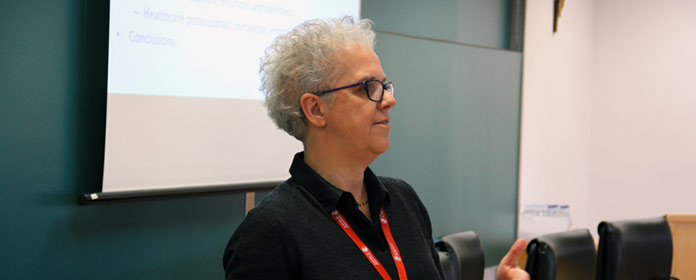"We use metaphors to talk about experiences that are subjective, emotional, sensitive or difficult for us and cancer is all of these things."
Elena Semino, professor of stylistics and linguistics at the University of Lancaster, participated in a workshop on metaphor organized by the Institute for Culture and Society

PHOTO: Elena Beltran
"We use metaphors to talk about experiences that are subjective, emotional, sensitive or difficult for us and cancer is all of these things." This was stated by Elena Semino, professor at Lancaster University at the MetaforUN International Workshop "Metaphor, Emotions and Identity". The event was organized by project 'Public discourse' of the Institute for Culture and Society of the University of Navarra.
Semino has conducted several investigations on the metaphors used by patients, physicians and families to talk about cancer and their importance in expressing this experience. One of the programs of study is a corpus in which they examine 1.5 million words used in interviews and in forums on the network. "There are more metaphors in online interactions than in the interviews we conduct with patients, because of the feeling of intimacy that the Internet provides," says the expert.
She has also analyzed the idea of what is a 'good' or a 'bad' death. The expert maintains that, although death is a difficult topic , the goal of professionals is to achieve the best possible quality of death. "But they have a particular vision of what a 'good death' has to be in relation to acceptance," she admits. Thus, they consider a bad death that of those who do not assume their future, or those who do not want to talk about topic. However, Semino affirms that the disease has so many facets and each person is so different that any way of dealing with the disease is legitimate "if that is what you want to do, as long as you do not harm anyone".
The metaphor of struggleIn her research, the professor has found that some struggle metaphors can be negative. They may feel that they have failed if the treatment does not work, that they are losing the battle," she says, "although at the same time they can be very motivating for some, they offer them a purpose". This contrast of reactions has led him to the opinion that "we must avoid generalizing and thinking that certain metaphors are always good or bad, we must look at the particular metaphor, who is using it and what it implies for them". For this reason they have created what they call "a menu of metaphors" with a collection of them so that each patient or professional can choose the one they prefer to talk about topic.
In addition to Elena Semino, other speakers at the workshop included Cristina Soriano, researcher at the Swiss Center for Affective Sciences at the University of Geneva, who spoke about the differences in emotions in different languages; and Carmen Sancho from the Universidad Politécnica de Madrid, who encouraged the promotion of metaphorical literacy in educational environments and research.




